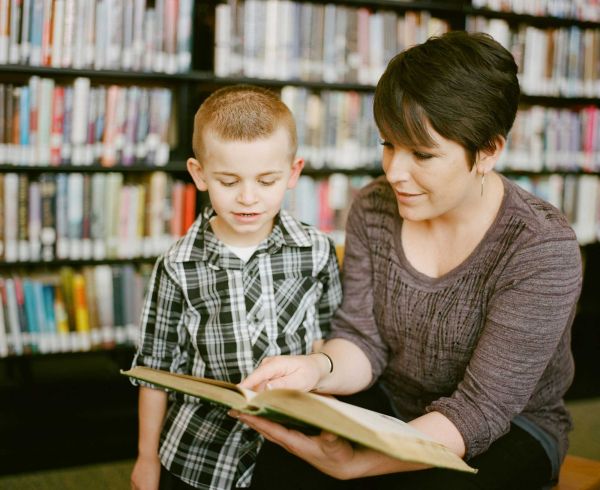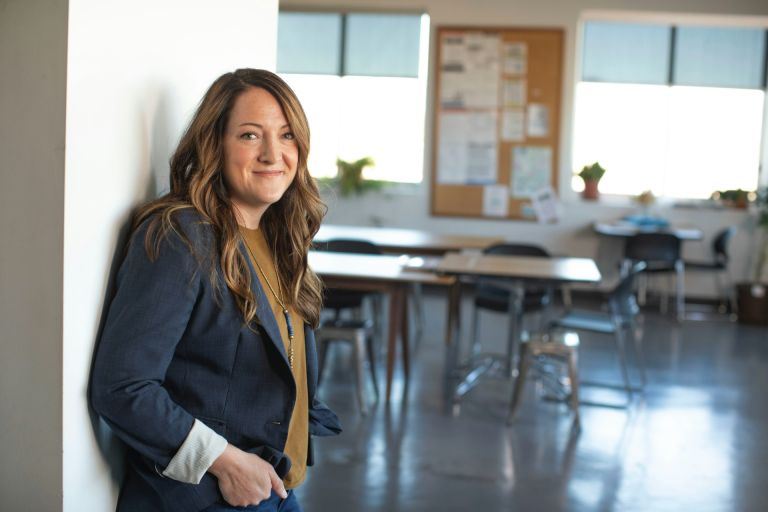About Sam
Sam has been a primary teacher for 5 years and enjoys the collaborative school environment. Sam says teaching can be an extremely rewarding job, particularly if you love variation in your day.

“I would encourage anyone undertaking any type of study to not be influenced by the ‘status’ of different universities. Instead, enrol in the course that will help you meet your goals.”
What was your pathway to teaching?
People – including teachers and family members – had told me I would make a great teacher. It felt like a natural path for me to take.
I loved the idea of having a job that didn't consist of sitting in an office all day, where my days would be varied. School holidays were also quite appealing!
Deferred studies and took a gap year.
Began an Arts degree, but then switched to Bachelor of Arts, Bachelor of Education (Primary) degree at a different university.
Entered the teaching profession.
A gap year, then changing universities
I started my studies part-time at one of Sydney’s newer universities and then deferred my degree to take a gap year. I ended up being away for 2 years and applied to a prestigious (‘sandstone’) university when I moved back to Australia.
I was really motivated to study at this institution; I had friends there and the prestige appealed to me. I was completing a Bachelor of Arts with the intention of completing a Masters of Education at the end of the 3 years.
But during the second semester of my first year, I decided to refocus and applied to a less traditional university to study a Bachelor of Arts, Bachelor of Education (Primary). This is where I finished my degree.
An Education degree typically takes 4 years full time, but due to bouncing around different universities, it probably took me 5 years. I would encourage anyone undertaking any type of study to not be influenced by the ‘status’ of different universities. Instead, enrol in the course that meets your goal.
Gaining practical teaching experience
Becoming a teacher requires 80 days of practical experience in the classroom during your degree. These placement periods are the most challenging part of becoming a teacher. They are unpaid and can feel quite stressful.
It’s worth checking with each institution how they approach these placements. Sometimes they are during the semester when you are attending classes and completing assignments. Other courses do not have teacher placement units until the third year of your degree. This means you can’t see if teaching is for you until you have already completed a large chunk of the degree.
Why did you become a teacher?
I have always enjoyed structure and organisation, so these skills gave me a great foundation. I also enforce high expectations in my classroom. This is beneficial for students and they respond positively. These skills are mastered gradually through your experience in the job and your teaching style will take some time to develop.
A supportive profession
Teaching can also be a really supportive profession if you are set up with a mentor teacher in your first years of teaching. They provide a great deal of support and guidance. Unfortunately, this isn't everyone’s experience, but it was mine.
As a beginning teacher you receive additional support if you sign a 1-year contract. This support can include being assigned a mentor teacher, additional time off class for planning, report writing time or professional development. Some schools will provide this time and support even if you haven't signed a full year contract, but it varies.
What does a typical workday look like?
This varies from school to school and for different individuals. It also depends where you live. Recently I moved to a school that was only 15 minutes from my home so it was much quicker to get to school by 7:30am.
Before school
The first thing I do at school is check emails to see if there are any urgent matters that need to be actioned. Then I prep all work for the day, that may include gathering resources, printing, borrowing books and organising the classroom. Depending on the day I might have a staff or parent meeting or a morning duty.
During school
Each day at school can vary dramatically and you may have an event, special assembly or planning sessions.
After school
When students go home I might have a parent meeting or staff meeting. I would complete any marking from the day, re-set the classroom and address any outstanding matters that have come up during the day.
My favourite part of my day would be the mornings, where I can set up my room and get ready for the day.
My least favourite part of my day-to-day routine would probably be having to spend "break times" addressing issues that have arisen during the day. This can feel chaotic and restrict your ability to decompress in between teaching sessions, leading to burnout.
A collaborative work environment
There is not much you do on your own. You collaborate on programs, marking, assessing and addressing student issues and concerns. I talk to colleagues and my stage supervisor (the educational leader of a year range such as Kindergarten to Year 2) every day and depending on the size of the school I would speak to the principal regularly.
Many successes in teaching are team successes, so these may be celebrated in staff meetings or during morning teas. There is often cake in the staffroom and people offering advice and help to others.
Work from home is not an option
You must be onsite at school between 8:30am and 3:30pm. There is additional preparation work outside these hours, but you have some flexibility to decide when you complete this.
Personally, I prefer to get to school early and leave earlier so I would typically leave between 3:30pm and 4pm but this can really vary on the day and what meetings are on in the afternoon. It is not uncommon for teachers to be at school until 5pm.
One of the biggest misconceptions about being a teacher is that you work short hours and have long holidays where you don't do any work.
You do have great holidays, although typically during these holidays you will spend some time writing reports and programs or catching up on administrative tasks from throughout the term.
“One of the biggest misconceptions about being a teacher is that you work short hours and have long holidays where you don't do any work.”
Sam’s career tips
Get to know some teachers
If you are thinking of joining the teaching profession talk to a few different people who are teachers and ask them about their experience. Think about which age group you would like to teach and what your goals are.
Get support and be aware of teacher burnout
Once in the industry, it is really important to lean on your colleagues and share your challenges, ask for advice and take time for yourself.
Frequently asked questions
A lot of schools use Sentral as their main form of communication. As a teacher you would find yourself using most Microsoft and Google applications. I like using Google Slides for lessons and my daily plan. It is a central way to move through lessons throughout the day and present the lesson’s content.
I think technology will play an increasing role in the next 5 years and the way we program and present lessons may change. AI could play a role in programming and lesson planning so this would be an interesting space to watch.
The only way I am aware of to get into teaching is by completing a Bachelor of Education or a Masters in Education. In terms of upward movement in teaching there are opportunities such as becoming a highly accomplished teacher, stage supervisor, deputy principal or principal.
Personally, after 2 years of teaching through COVID, I am taking a step away to travel and revaluate what is next.
A challenging part of teaching can be finding the time to accomplish all that is required, as you have many competing priorities. It can feel like you do not have the time or resources to do everything to the best of your ability. It is important to lean on colleagues and take time for yourself as teaching demands a lot of your time and energy.
Something else I found difficult was making the jump from finishing my degree to getting the various checks required to start teaching.
There are many skills and attributes required to work in teaching. Two of the most important attributes are to be compassionate and kind. This is particularly important if you are pursuing early childhood education or primary education. You also need to be highly resilient, as teaching can be extremely challenging when you are trying to meet the needs of 18 to 30 different individuals.
The skills required are varied and different people bring different strengths to the profession. Desirable skills would be a high level of organisation, and someone who is a great communicator, collaborative and flexible. Being in a school environment means shifting and refocusing constantly and not getting frustrated if things ‘didn't go to plan’.
As a teacher it is mandatory to participate in year-round professional development and complete a professional development plan each year to support your desired areas of growth. This is supported by your stage supervisor. The areas in my professional development that I am most proud of are having confidence in my own teaching and decision making.
There are a lot of ways to find a job in teaching. People make connections through the placement schools they attend during their degree and this can lead to employment.
There are websites that provide opportunities for casual employment and also advertise full-time positions. You can also look on I Work for NSW or Staff Noticeboard if you are already employed by the Department of Education.
Additional questions about Education and Training?
NSW Careers has a team of industry experts who can talk to you one-on-one about what it’s like to work in this industry.

